- Home
- Saul Tanpepper
Iceland: An International Thriller (The Flense Book 2) Page 2
Iceland: An International Thriller (The Flense Book 2) Read online
Page 2
Lieutenant Commander Tsoukalas grabbed the woman and tried to push her down. She fell without uttering a word, then stood back up again, still mute. She looked straight up at Nikos, and a bolt of fear slammed through his body as their eyes locked for half a heartbeat. They were the same eyes he had dreamed of, utterly black and devoid of consciousness.
The very last thing he remembered, right before the refugees attacked, was the hissing sound, like air leaking from a dozen pressurized tires all at once.
Chapter Two
November
13ÈME ARRONDISSEMENT
PARIS, FRANCE
The rain was a terrible, spiteful thing, so loud and so bitterly cold that it chafed Angel's skin and ears to equal measure. It turned the City of Lights into a dreary canvas, a monochromatic Dali painting of melting and shifting pewter shapes.
The day had broken with nearly cloudless skies and a refreshing crispness to the air. The weather forecasters promised an unseasonably warm day, the first since the stubborn cold front settled over the continent a couple weeks back. Even when dark clouds rolled in on a bitter wind from the north before midday, the prognosticators stood resolutely by their claims. "It'll pass, a temporary lull. By early afternoon, the sun will be back."
Their predictions were met with rumbles of thunder.
Not even the end of fall, and already it felt to Angel as if winter were trying to make up for the brutally hot summer they'd just endured.
In the southeastern corner of Paris, along the south bank of the Seine, gloom had a firm grip beneath the Charles de Gaulle Bridge, turning the migrant encampment from a place of refuge and hope into a dreary, menacing scene. Rows upon rows of three-person tents, at least two hundred of them, occupied as much space on the ground as was possible, leaving only a few narrow lanes for walking.
At this time of day and in this weather there was no foot traffic along this particular section of the river. Not that many people ventured there anymore, even when the sun was out. The bridge was in an industrial area of the city and out of the way, far beyond the normal tourist haunts.
A nightclub just upriver drew the majority of traffic, young locals and international college students looking for a break from their studies, but few of the revelers cared to stray from the well-marked, well-lit paths, and even fewer still came since the encampment had grown so large. The regular Metro riders from the nearby station at Gare d'Austerlitz all knew to avoid the area.
Only the lost or cynical came to ogle the bedraggled and dispirited men, women, and children, and they came only when the weather was fair.
Most of the tents had been donated by local missions. They were marked with the usual brands of their benefactors silkscreened in large white letters: Espère Société, UNCoR, Charité des Étrangers . . . . The shelters were flimsy, the material cheap, not meant for long term habitation. The fabric rippled noisily, a syncopated patter against the constant low drone of the wind through the ironwork. Water droplets the size of pebbles plummeted down from cracks in the concrete, falling with such ponderous speed that they exploded upon the thin material like rotten eggs.
The smell of spoiled food and human waste, of five hundred unwashed bodies and soiled clothing, had become so insinuated in the air that not even the breeze could erase it.
Some of the tent flaps were unzipped. Peering within, Angel spied the emaciated faces of women and children, devoid of all but a few traces of hope, filled instead with despair.
The men huddled in groups near the edges of the overpass, just out of the deluge, their hands thrust deep into the pockets of their thin jackets and their eyes cast restively upon anyone who ventured too near or dwelled too long. Some had filthy blankets draped over their shoulders, moth-eaten and stained, coarse with horse hair. Most of these appeared to have been stolen, though others were charity donations or army surplus. The men spoke to each other in loud voices, as if their anger could dispel the chill.
"It's not going to be enough," Angel quietly told the young Somali man she had hired four days earlier to help her deliver the cases of bottled water. She hadn't expected as many people as she found here, more by far than she'd seen at any of the other camps.
"Three thousand bottles," said the man, whose first name was Omar. Angel could never seem to get his last name right. It was an unpronounceable tangle of sounds that her tongue and lips seemed culturally incapable of reproducing with any reliability.
The Somali was a thin whisper of a man, though wiry strong and eager, and he had been more than grateful for the opportunity to help her deliver the water, even for what seemed to her a mere pittance in salary. It shamed her that he felt fortunate for her meager charity, shamed her because of the stinginess her fellow countrymen showed to these people. "There will be enough water, Miss Angel," he told her in his broken English.
"Il y aura suffisamment d'eau," she translated for him. She'd been trying to teach him a few words and phrases in French. If he was going to live here, it would help his assimilation.
He nodded and smiled, humoring her, but didn't repeat the words.
"Enough water maybe," she said, sighing. She squinted out at the pouring rain and shook her head. "But not enough of anything else. I'll probably take another trip to the pharmacy and buy some more vitamins."
She had spent half the summer locked up inside her home at Chèvrefeuille, unable to do anything but watch as the refugees arrived. All of Europe was affected now, the unending conflict in the Middle East giving rise to an unprecedented humanitarian crisis. Migrants flocked to the cities and set up refugee camps in places lacking adequate infrastructure to support their needs. She worried about the intestinal diseases which would invariably spread through the overcrowded communities. The lack of decent facilities, good food, and clean water. The absence of regular hygiene coupled with the close quarters. The fast-approaching winter. Altogether, it was a sure formula for a public health disaster.
An especially violent period of unrest in the Middle East triggered by the rise of new terrorist groups out of the ashes of the crumbling Islamic State of Iraq and the Levant had sent another tidal wave of refugees north. But if ISIL had been brutal, the fledgling groups all seemed determined to snatch the title of most evil from the others.
Borders were shut. And yet the refugees continue to arrive, hundreds of thousands of them traveling by foot and rail and car each week, settling wherever they could, wherever they felt a trace of safety, or stopping out of pure exhaustion. There had once been so much more patience and tolerance and sympathy for them. But goodwill had long since been exhausted.
With them came violence, distrust, fear. And there was no workable solution in sight.
Then, more bad news. The World Health Organization announced in early September that cases of influenza were rapidly mounting, striking at elevated levels across the globe. It was, they warned, an especially virulent strain this time with a significantly higher mortality rate, a strain not covered by existing vaccines. The abrupt change in weather and the movement of so many people facilitated its spread.
In a two-month period, six hundred ninety-two immigrants within the city limits had died from flu-related causes, more than three-quarters directly from the infection and a quarter more from exposure or malnutrition. And it was still only November.
On top of this, many others were victims of the growing violence borne out of poverty and desperation. Nearly a hundred refugees suffered fatal injuries from trauma, while dozens more were treated for non-life threatening wounds. Police reported that sixty females were victims of brutal sexual assaults, many of them underage. Several-fold more attacks undoubtedly went unreported, and likely many of the most vulnerable among them simply disappeared, victims of human trafficking.
After months cowering inside her neglected home, unwilling to see or speak with anyone, Angel finally felt compelled to act.
She took a step toward a group of men at the other end of the bridge overpass, the rain a metallic curtain just
beyond them, and winced as a bolt of pain arced from her neck down her left side. She was physically healed from the injuries she'd sustained five months prior, at least visibly, but every now and again her body provided her a not-so-subtle reminder of the horrors to which it had been subjected half a world away.
The trauma inflicted upon her mind was much more persistent and still very raw. The memories refused to be wrested from her, despite her deepest wish to forget them, to simply move on. Not a night passed without some nightmare interrupting her sleep, reminding her of how close she had come to dying. She fervently wished never to be in such a situation again.
"You okay, Miss Angel?"
Omar stepped in front of her. His bushy eyebrows, sprinkled as much with white as black, were knitted together with genuine concern. He reached out, though he stopped short of actually touching her.
For a moment she didn't see him. Instead, it was Jian standing there, the Baarin boy who'd been killed in a firebombing raid of his tiny village in the remote reaches of Inner Mongolia. The anguish on the face of the man responsible, Norstrom, had seemed genuine at the time. He claimed that it had been unintentional, and she had believed him then.
But in the months since, she began to wonder if he had lied to her. Why else would he have insisted she keep her story from the world?
He claimed to have infiltrated a secretive biomedical company conducting illegal medical experiments on people, injecting them with tiny machines called nanites. They were supposed to do incredible things, but she had witnessed firsthand the terrors they could create.
Afraid the public would find out, the company had hired Norstrom to erase evidence of those experiments, not knowing that he was secretly gathering evidence of international crimes. They even ordered his use of napalm to burn away large swaths of potentially incriminating grassland, an area which he had evacuated hours before. Arriving late, she had been nearly consumed in that attack, barely managing to escape before the yurt she'd been asleep in exploded in flames.
The memories stuck to her as stubbornly as the burning chemical did to everything it touched, searing her mind, yet unable to purify it in the way that the real stuff did to the ground. There were moments when she woke from sleep, her heart stampeding through her chest, and she could still feel the rumble of the plane's engines and the heat of the fire on her skin. In such moments, she had no doubts that her life was about to end.
The entire village had been razed in minutes. The animals tried to flee, but in their panic they carried the burning gel on their pelts, spreading the flames into the surrounding veldt before finally succumbing themselves. The fire had raged so hot that even their bones had been rendered to ash.
"Miss Angel?"
She blinked, and the horrible vision, the terrible sounds and smells, were suddenly gone. The heat and searing pain replaced by the damp chill of the dreary fall afternoon. No young Jian here, just the ageless wrinkled man with the dark, crinkly eyelids. And, for her, a lingering resentment directed at the man who had saved her life while simultaneously throwing it into an unremitting purgatory by denying her any closure.
"Are you okay, Miss Angel?" Omar asked again.
Missus, she thought with mild irritation, though she gave him a thin smile. "Oui. Yes. Just a little achy. It is the weather. I am not as young as I used to be."
"Omar much older."
"You are not old," she automatically replied, before realizing how patronizing it sounded. He had to be in his late forties, though he looked at least ten years older.
A loud cough came from the group on the other side of the encampment, drawing their attention for a moment. The sound echoed through the cavernous space, slapping hard against the concrete ceiling. They watched as the man leaned over with his hands on his knees and continued to hack. It looked and sounded painful. When he was finished, he spat out into the rain.
Other coughs and wheezes sounded from the direction of the tents, though thankfully far fewer than she had heard in other camps.
"Omar, would you mind bringing down the water from the van?"
"Leave you alone?" He eyed the loitering men with unmasked distrust.
Having now noticed the newcomers, the refugees stared back unapologetically, waiting to see what she and Omar were up to.
"I'll be fine. Don't worry about me."
"These are Syrian men. Some Turkish. Muslim."
"Yes, Omar, I know. And you are Somali Christian. But we are all Parisians now, are we not? It will be okay. Go ahead and bring down the water."
He gestured at her handbag, a worn canvas tote, now filthy from the fingers of a thousand curious children. It held a dozen new bottles of acetaminophen and multivitamins. "They try to steal."
"I do not think so."
He hesitated a moment, then shrugged and plunged out into the rain in the direction they had come.
One of the men broke off the group when she approached. He seemed to understand that she wished to speak with them.
"My name is Angelique de l'Enfantine," she said, after the distance between then narrowed enough so that she wouldn't have to shout over the noise of the rain and wind. She pulled out her IAFJ press badge. "I am an investigative reporter. I would like to talk to you."
Something flashed across the man's face, and the muscles high on his cheeks began to throb. He stopped a few meters away, not blocking her, but positioning himself in such a way that clearly conveyed she wasn't welcome to approach any further.
"Do you speak English?" she asked. "I— My friend, Omar, is bringing cases of bottled water down for everyone."
The man gestured at the rain and barked out a hard laugh. "Water? We have too much water."
Angel frowned. "I just thought—"
He shouted in Arabic at the men behind him. Angel tensed up. When none of them responded, he repeated his words much louder and with greater urgency. He pointed at a cluster of teenagers, then gestured at the other side of the overpass. Reluctantly, a half dozen of the boys broke away from the group and began to wander over.
"They do not want to leave," the man explained to Angel. "They want to see what you bring in bag, if it is for them. They are afraid they will not get any if they are not here."
Angel nodded and relaxed. "It is just basic medicine. And vitamins."
"Medicine," he said, frowning and shaking his head. He pointed around them at the tents. "We need work. Food. Money. We need a warm, safe place to live. We have already enough water. And we do not need medicine."
She pulled a bottle out and offered it to him, explaining that it was vitamins to help them fight off infections, but he refused to take it. "People already come today. Give medicine. Make sure everyone is healthy."
"They did?" This came as a surprise to her. She hadn't heard of anyone else handing out medicine in any of the other camps. "Who?"
He didn't answer.
Angel leaned to the side and glanced pointedly at the sick man as he broke out into another coughing fit. "Did he get any medicine? Because he sounds like he has a terrible infection in his lungs. He might need antibiotics. Unfortunately, I do not have—"
"Are you doctor?" he abruptly demanded. "Are you from hospital?"
She frowned, then shook her head. "I do not work for any hospital or health organization. I am a reporter."
"I am sorry. You go now. I cannot talk with you."
"Why not?"
She grabbed his arm before he could walk away. "I only want to help. I have visited some of the other camps around the city. We are doing all we can to get you the help you need, but I need you to talk to me. It will only help if we can spread the word."
She could see the indecision in his eyes, and behind it, the ever-present fear. What was he so afraid of? Relocation?
One of the camps she had visited the week before had been dismantled by the national security forces the next day after it became the focus of a terrorist threat. The soldiers searched for weapons and other potential risks, but other than a fe
w knives crafted for personal protection, they'd found nothing.
The migrants had been bused to a camp further north, where she'd heard the conditions were even worse. A half kilometer from a major thoroughfare, without facilities or hope of aid, it was as if the government meant to sweep them out of sight. The poor people were deposited inside a compound surrounded by chain linked fences, where they were treated like prisoners.
"Look," she said, "I will not publish anything you tell me unless you agree that it is okay. I just want to help."
He studied her face for several moments, the muscles in his cheeks like sheets rippling in the wind.
"Do you know the name of the agency that brought you medicine?" she asked. "Was it United Nations? Red Cross? Did they give that man antibiotics, because that is what he needs."
"You should not worry about Sharif. He will be better tomorrow." He absently tapped a finger on the crook of his elbow. "They give him shot."
"An injection? Just one? No pills? Was it a vaccination? Because the flu—"
"One shot," he repeated. "Each week they come, check everyone who is here. I myself have shot two weeks ago now. You wish to meet, come back again next week. Seven days."
It seemed to Angel like an odd sort of treatment plan, just a single injection. But of what? Considering the range of pathogens which could potentially spread in a place like this, both bacterial and viral, a single dose of anything seemed woefully inadequate.
Unless it's some kind of new broad spectrum antibiotic or a multi-potent vaccine.
If it was, she had not heard of it.
"And it works?" she asked.
"I was sick before, but not now."
"Show me again where they gave you the medicine," she asked.
The man once more indicated the crook of his elbow. "In here. Everyone get shot here, adult and children. Same. And only one time. Not need more than one shot."
Angel's frown deepened. The first time she'd assumed he'd been careless and had actually meant to point at the muscle in his upper arm, which was the more conventional site for an injection. Administering medicine directly into the vein was highly atypical.

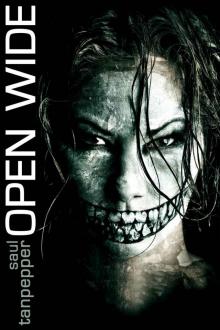 Open Wide
Open Wide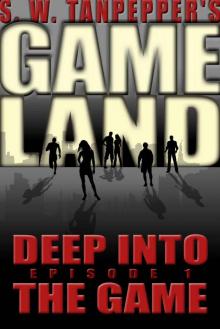 Deep Into the Game: S.W. Tanpepper's GAMELAND (Episode 1) (Volume 1) (S. W. Tanpepper's GAMELAND)
Deep Into the Game: S.W. Tanpepper's GAMELAND (Episode 1) (Volume 1) (S. W. Tanpepper's GAMELAND)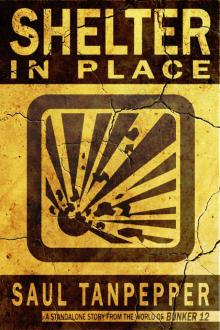 Shelter in Place: A short story from the world of BUNKER 12
Shelter in Place: A short story from the world of BUNKER 12 Iceland: An International Thriller (The Flense Book 2)
Iceland: An International Thriller (The Flense Book 2) GAMELAND Episodes 1-2: Deep Into the Game + Failsafe (S. W. Tanpepper's GAMELAND)
GAMELAND Episodes 1-2: Deep Into the Game + Failsafe (S. W. Tanpepper's GAMELAND)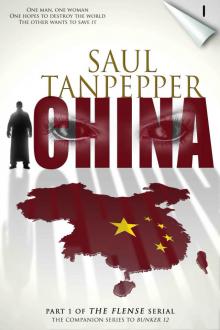 THE FLENSE: China: (Part 1 of THE FLENSE serial)
THE FLENSE: China: (Part 1 of THE FLENSE serial) S.W. Tanpepper's GAMELAND, Season One Omnibus
S.W. Tanpepper's GAMELAND, Season One Omnibus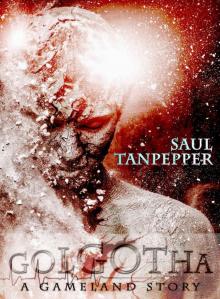 Golgotha: Prequel to S.W. Tanpepper's GAMELAND series (S. W. Tanpepper's GAMELAND companion title Book 1)
Golgotha: Prequel to S.W. Tanpepper's GAMELAND series (S. W. Tanpepper's GAMELAND companion title Book 1)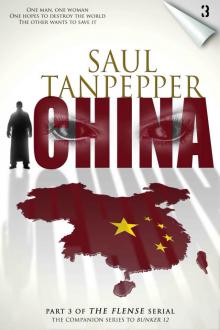 THE FLENSE: China: (Part 3 of THE FLENSE serial)
THE FLENSE: China: (Part 3 of THE FLENSE serial)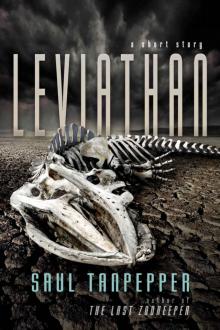 Leviathan: A Short Story About the End of the World
Leviathan: A Short Story About the End of the World Insomnia: Paranormal Tales, Science Fiction, & Horror
Insomnia: Paranormal Tales, Science Fiction, & Horror Velveteen
Velveteen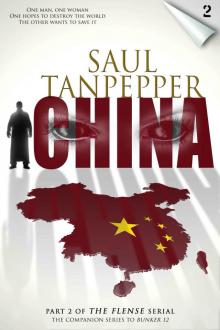 THE FLENSE: China: (Part 2 of THE FLENSE serial)
THE FLENSE: China: (Part 2 of THE FLENSE serial) Deadman's Switch & Sunder the Hollow Ones
Deadman's Switch & Sunder the Hollow Ones